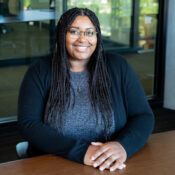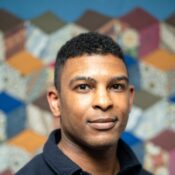What Does Diversity Science Say About Belonging & Community?
Day Two: November 14, 2024 | 2:45 p.m. – 3:45 p.m.,
Session Video
Session Description
Diversity science research provides evidence-informed solutions to complex social problems, like inequality, so that individuals and communities can be their best and bring out the best in those around them. Diversity science can help harness the power of research to leverage cultural diversity to work for us and not against us.
This panel will present diversity science research from three leading scholars at UW-Madison studying factors that promote belonging and community in various settings. Moderated by Professor Angela Byars-Winston, the panelists will address the following topics:
- How do online systems foster the development of community across diverse coalitions and what does that mean for belonging in society?
- How can better mental health care for marginalized populations increase belonging and lead to better community outcomes?
- How do organizations respond to diversity and what does that say about belonging in the workplace?
Session Objectives
- Understand what diversity science is
- Increase awareness of diversity science research related to belonging and community in mental health, the workplace, and in online environments
- Learn evidence-informed strategies for promoting belonging and community
- Identify local diversity science research opportunities to advance belonging and community
Speakers
Angela Byars-Winston
Dr. Angela Byars-Winston is a Vilas Distinguished Achievement Professor of Medicine at UW–Madison. She conducts diversity science research on cultural and organizational influences shaping the career development and effective mentorship of college students and early career faculty in science, technology, engineering, mathematics and medicine (STEMM). She is Principal Investigator in the NIH National Research Mentoring Network, leading the Culturally Aware Mentorship (CAM) initiative, and is a current appointed member of the NIH National Advisory General Medical Sciences Council. Dr. Byars-Winston is the 2022 recipient of the Outstanding Educator for Innovation in Mentorship Research Award from the Association of Clinical and Translational Science, and the inaugural Chair of the UW–Madison Institute for Diversity Science where she hosts the Diversity Science Podcast. She is the immediate past president of the South-Central Wisconsin chapter of Jack and Jill of America, Inc., the nation’s oldest member organization of Black mothers.
Kyesha Isadore
Dr. Kyesha Isadore is an assistant professor of rehabilitation psychology at UW–Madison. Dr. Isadore’s work primarily centers on how intersectionality impacts mental health with special attention to race/ism, gender, and disability. She uses qualitative and quantitative methods to study therapeutic outcomes for marginalized populations, mental health for people with psychiatric disabilities, and multicultural and social justice competencies for counselors-in-training. Dr. Isadore’s research highlights the impact of multiple systems of oppression on the mental health of people with multiple marginalized identities. Primarily centering racially/ethnically minoritized people with disabilities, her research aims to understand how we can best support this population in various settings and to find ways to improve their psychosocial outcomes.
Corey Jackson
Dr. Corey Jackson is an assistant professor in The Information School at UW–Madison where he co-directs the Collaborative Computing Group. He is also a faculty affiliate in the UW-Madison Robert & Jean Holtz Center for Science and Technology Studies, the UW–Madison Institute for Diversity Science, and the UW–Madison Data Science Institute. His research lies at the intersection of Computer Supported Collaborative Work (CSCW) and human-centered design/computing. Dr. Jackson’s work investigates the approaches to enhancing contribution by crowds in online environments. Using mixed methods approaches and data science techniques, he investigates how people (‘‘the crowd’’) contribute to and participate in virtual citizen science, including on diversity issues in online communities. Dr. Jackson’s prior research projects have included: studying the motivations of volunteer crowd workers, investigating learning behaviors, using theory-based motivational cues to enhance participation, and investigating the coordinative mechanisms of knowledge production.
Jirs Meuris
Dr. Jirs Meuris is an assistant professor in the Management and Human Resources Department at UW–Madison with a courtesy appointment in Sociology. He is a faculty affiliate at UW–Madison’s Institute for Diversity Science; Center for Law, Society, and Justice; and Institute for Research on Poverty. His work sits at the intersection of human resources management and public policy focused on examining how demographic and economic disparities affect workplace and organizational outcomes. Dr. Meuris’ research has been published in top journals such as the Academy of Management Annals, American Sociological Review and the Journal of Management, and has been featured in numerous media outlets including The Atlantic, Harvard Business Review, Washington Post, Wall Street Journal, and Bloomberg. He has also appeared on various radio and television programs such as NPR’s Marketplace, Wisconsin Public Radio, and WTV Live at Four.



